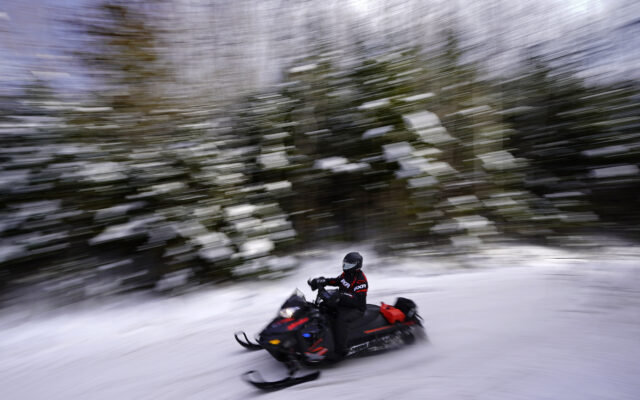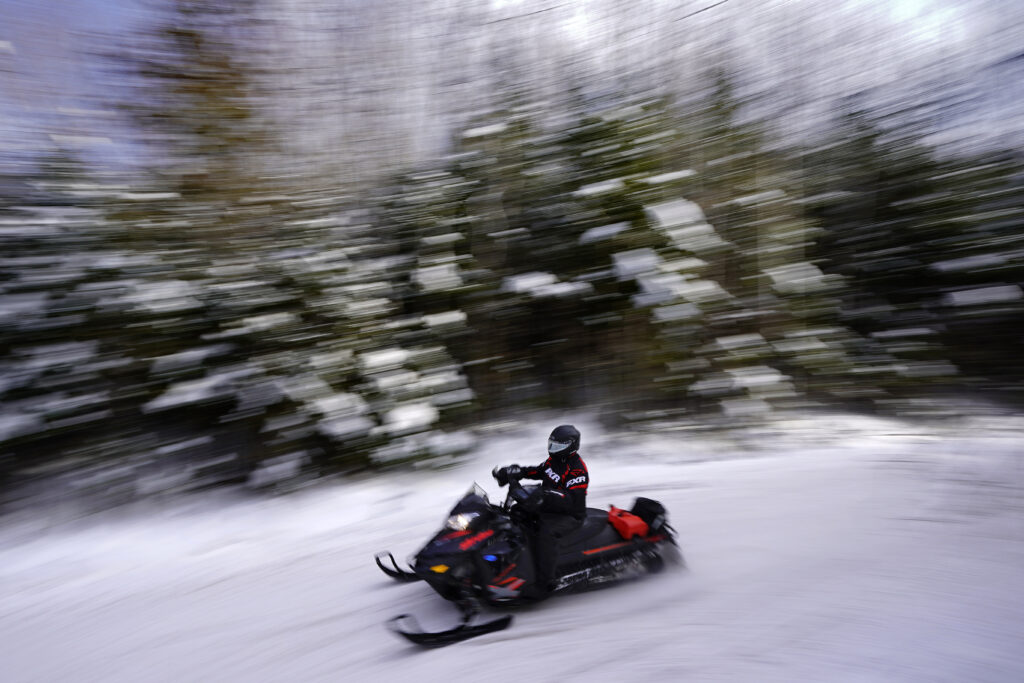
Snowmobilers who ignore this sign can be charged with trespassing
By Julie Harris, Bangor Daily News Staff
Landowners who have endured thousands of dollars in damage to their properties now have a way to keep snowmobilers off sensitive areas thanks to a new law in effect this season.
The law, LD732, established a civil trespassing violation for snowmobilers who ride off-trail in areas posted by a red sign indicating a snowmobiling ban. Violators can be fined from $100 to $500. A person cited with a violation three times can be charged with a misdemeanor crime, according to the law.
All-terrain vehicle users are already restricted to riding on trails or are required to have written permission from landowners to be off-trail. There were no laws restricting off-trail riding by snowmobilers until this one.

TRAIL RIDE — A person on a snowmobile rides on a trail, Saturday, Jan. 23, 2021, in Rangeley.
“The snowmobile industry is changing so fast. Our rules are behind the times,” said Col. Kris MacCabe of the Maine Warden Service on Nov. 28. “We want to limit people from where they are not supposed to be, not stop people from going off trail.”
Landowners must place the red signs in obvious places, such as at the beginning or end of a trail or at the entrance of farmland or a woodlot, he said.
MacCabe said that he fielded an average of three complaints from landowners a week last season. Complaints came primarily from farmers and owners of large tracts of forestland used for logging.
Snowmobiling on farm fields that have new grass crops for pastures or water pipes for irrigation can pack the snow down and cause winter kill and equipment damage, MacCabe said. People think the tracks will disappear when the snow melts and there will be no harm done, he said.
But that’s not how it works.
Forestland owners have complained about snowmobilers riding in areas where there are recently planted young trees. Running over the saplings ruins them by breaking off the growing tops.
It costs companies like JD Irving and Sappi thousands of dollars in lost growth and replacement plants, said Joe Higgins, off-road recreational vehicle supervisor for the Maine Department of Agriculture, Conservation and Forestry’s Bureau of Public Lands, on Nov. 29.
Maine’s snowpack isn’t deep enough to provide a cushion between the sleds and what’s under the snow, Higgins said.
Power companies also want people to stay on the trails, citing safety concerns about guy wires and other hazards to snowmobilers on powerlines, he said.
“Some people see it as a right, but it’s really a privilege to use privately owned land,” Higgins said. And with 95 percent of the state’s extensive trail system on private land, keeping landowners happy is imperative, he said.
Everyone, not just snowmobilers, is responsible for using private land respectfully, MacCabe said.
The signs are being distributed by the state, the Maine Snowmobile Association and the local clubs.
Local clubs are being educated now, making sure sledders know the new signs are to protect the landowners they depend on to have a trail system, said Al Swett, president of the Maine Snowmobile Association, on Nov. 29.
Maine’s trail system draws people from all over the country to visit the state during snowmobiling season. It benefits other businesses too, such as restaurants, lodging places and stores, Swett said.
The association supported the legislation.
“Landowners are generous. It shouldn’t cost them money,” Higgins said. “The closure of one mile can close hundreds of miles of trail. We want it to be a safe sport. Landowners want this too.”